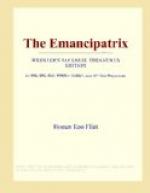Next moment she got a grip on herself. “What difference doth it make, whether they be friend or enemy?” she argued severely, for the benefit of her shaking nerves. “They will give thee food, anyhow. And perchance they know where liveth the magic stone!”
In the end Rolla’s high purpose prevailed over her weak knees, and she began to look for the entrance to the place. It was partly in ruins— that is, the upper stories—but the two lower floors seemed, so far as their interior could be seen through the high, unglazed windows, to be in good condition. There were no doors on that street.
Going around the corner, however, Rolla saw a high archway at the far corner of the structure. Approaching near enough to peek in, she saw that this arch provided an opening into a long corridor, such as might once have served as a wagon or auto entrance. After a little hesitation she went in.
She passed a door, a massive thing of solid brassy metal, such as interested the doctor immensely but only served to confuse the explorer. A little farther on, and the corridor became pretty dark. She passed another brass door, and approached the end of the pavement. There was one more door there; and she noted with excitement that it was open.
She came closer and peered in. The room was fairly well lighted, and what she saw was clear-cut and unmistakable. In the middle of the room was a long table, and seated about it, in perfect silence, sat an even dozen men.
XIII
THE TWELVE
For a minute or two Rolla was not observed. She simply stood and stared, being neither confident enough to go forward nor scared enough to retreat. Childlike, she scrutinized the group with great thoroughness.
Their comparatively white faces and hands puzzled her most. Also, she could not understand the heavy black robes in which all were dressed. Falling to the floor and reaching far above their necks, such garments would have been intolerable to the free-limbed Sanusians. To the watchers on the earth, however, the robes made the group look marvelously like a company of monks.
Not that there was anything particularly religious about the place or in their behavior. All twelve seemed to be silent only because they were voraciously hungry. A meal was spread on the table. Except for the garments, the twelve might have been so many harvest hands, gathered for the evening meal in the cook-house. From the white-bearded man who sat at the head of the table and passed out large helpings of something from a big pot, to the fair-haired young fellow at the foot, who could scarcely wait for his share, there was only one thing about them which might have been labeled pious; and that was their attitude, which could have been interpreted: “Give us this day our daily bread—and hurry up about it!”
Apparently Rolla was convinced that these men were thoroughly human, and as such fairly safe to approach. For she allowed her curiosity to govern her caution, and proceeded to sidle through the doorway. Half-way through she caught a whiff of the food, and her sidling changed to something faster.




